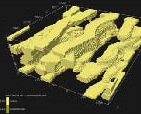Markov mesh models for patterns on multiple grids
Markov mesh models for patterns on multiple grids
When modeling oil- and gas-reservoirs one defines a 3D grid and fills this grid with sand and shale. The patterns formed by the porous and permeable sand and the impenetrable shale, determines the flow properties of the reservoir. It is necessary to take into account statistical uncertainty and study the flow properties from a probabilistic point of view. Markov mesh models constitute one methodology for doing this. The starting point is a 3D training image. The model analyses and stores information about the training image’s patterns and then simulations are done from this model.
Large scale patterns handled by using multiple grids. A complication arises if the training image patterns are on a much larger scale than the grid itself. Since the Markov mesh model during simulation uses information only from a limited neighborhood around each cell, it cannot “see” far enough to capture the large scale patterns.
At NR we have solved this problem by using multiple grids. We start at a coarse scale grid and simulate the large patterns first. During subsequent grid refinements and simulations we capture patterns on a finer and finer scale. At the end the whole grid is simulated, with patterns reproduced at all relevant scales.
The ideas of using multiple grids, is also used in for instance SNESIM. Applying it to the Markov mesh model we obtain the improvement of combining the smart usage of multiple grids with a mathematical consistent model. The results are very good and hold promise of a robust technique that applies to many different training images.
Publications
Kjønsberg, Heidi; Kolbjørnsen, Odd (2008) Markov mesh simulations with data conditioning through indicator kriging. In: Proceedings of the eighth international geostatistics congress, vol 1. Kluwer, Dordrecht, pp 257–266
Stien, Marita; Kolbjørnsen, Odd (2011). Facies Modeling Using a Markov Mesh Model Specification. Mathematical Geosciences. ISSN 1874-8961. 43(6), 611-624. doi: 10.1007/s11004-011-9350-9
Kolbjørnsen, Odd; Stien, Marita; Kjønsberg, Heidi; Fjellvoll, Bjørn; Abrahamsen, Petter (2014). Facies Modeling Using a Markov Mesh Model Specification. Mathematical Geosciences. ISSN 1874-8961. 46(2), 205-225. doi: 10.1007/s11004-011-9350-9
Institute reports:
- Kjønsberg, Heidi; Stien, Marita; Fjellvoll, Bjørn; Kolbjørnsen, Odd; Abrahamsen, Petter. Methods of the Markov Mesh Multi-Grid Module in RMS (2011) 44p, NR Note: SAND/21/2010
- Stien, Marita. The Markov mesh multi-grid module versus the Multipoint module in RMS (2011) 41p, NR Note: SAND/16/2011
-
Stien, Marita; Kolbjørnsen, Odd. Markov mesh model specification for facies modeling (2010) 22p, NR Note: SAND/09/10, Institutional archive

-
Stien, Marita; Kjønsberg, Heidi; Kolbjørnsen, Odd; Abrahamsen, Petter. An implementation of conditional Markov mesh simulation with parameter estimation (2008) 36p, NR Note: SAND/04/2008, Institutional archive

-
Kjønsberg, Heidi; Ligaarden, Ingeborg. Second order Markov mesh models described as Markov Random Fields (2006) 50p. NR Note: SAND/07/06, Institutional archive


Contact information
Project period
Financing
- Statoil
- Roxar


 How to get to NR
How to get to NR Share on social media
Share on social media Privacy policy
Privacy policy